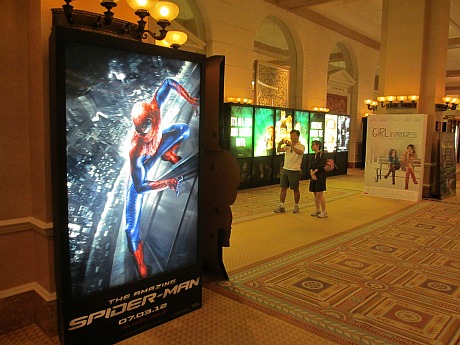A fund-raising email from the irrepressible James Carville just arrived, and reads as follows: “After Mitt tried to steal my line, you know I have to call him out. In Romney’s speech bashing President Obama last night, he said, ‘It’s still about the economy, and we’re not stupid.’ Yeah, it still is about the economy, stupid. It’s about how hucksters like Mitt crashed it, the middle class paid the price, and the top 1% got more tax cuts. It’s also about Republicans going to war on women, trying to cut seniors off their Medicare and all the rest. Let’s beat these guys.” Yeah!
Hitchcock Scorsese 3D
During a just-concluded Cinemacon panel called “Frankly Speaking: The Ever-Changing World Filmmaking Today, Tomorrow and Beyond,” moderator Todd McCarthy asked Martin Scorsese what his learning process was on shooting Hugo in 3D, and part of his answer was that Alfred Hitchcock‘s Dial M for Murder offered inspiration about “how to go” with 3D. Director Ang Lee also particpated.
Walkabout
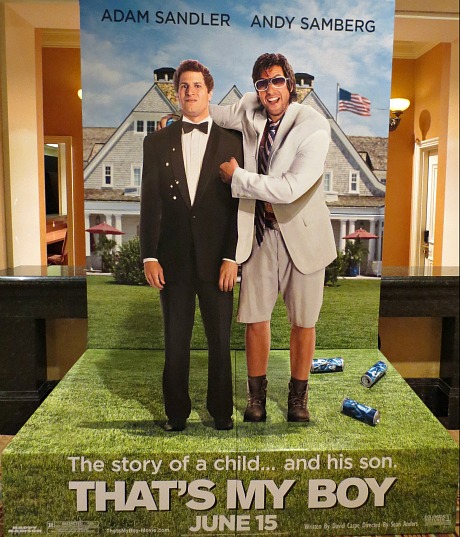

What kind of Las Vegas tourist would want to visit a chapel? A hardcore gambler on the skids? I don’t think they have chapels in Monte Carlo casinos. Welcome to the hypocrisy and indigestion of American Christianity.
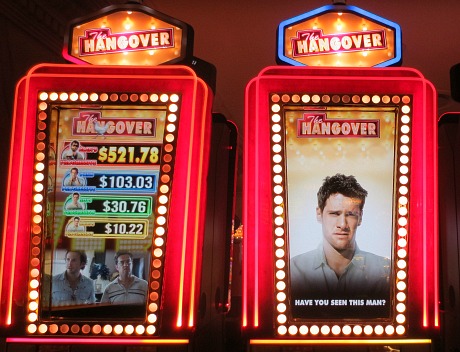
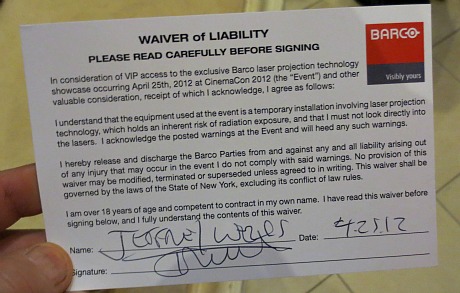
A form you had to sign before attending this morning’s Barco Laser Projection demonstration inside the Collisseum. Ridiculous. There were no laser beams flashing around the theatre when the show began. The laser light is entirely housed with the digital projector. Laser projection can generate 20 foot lamberts or higher. It’s brilliant — one solution, certainly, to dark 3D.
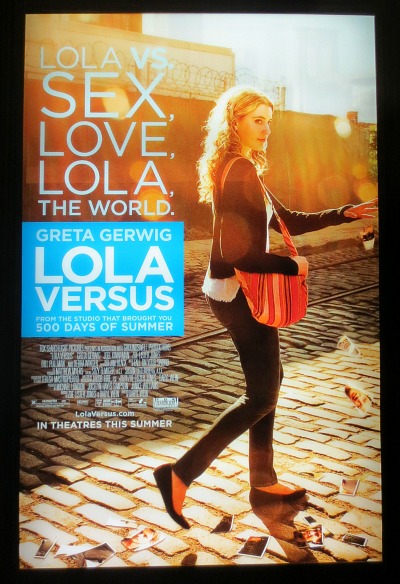
Lowdown on Rocchi Fantasia
As regulars know, the fascinating “Ira Parks” has been doing an HE commenting routine in which he becomes (i.e., enters, takes possession of) significant HE commenters and voices their thoughts and ruminations. Ironic, layered, meta on meta stuff. Yesterday and for whatever reason he ran a little fictitious riff about MSN’s James Rocchi having been arrested in Las Vegas…WHICH DIDN’T HAPPEN, IN LARGE PART BECAUSE MR. ROCCHI ISN’T EVEN HERE.
Then Parks posted a “Jeffrey Wells says” follow-up about Rocchi considering legal action against the Las Vegas police department as well as myself. In response to this Rocchi got in touch this morning to castigate me for writing this. He saw my name and didn’t realize it was Parks. C’mon!
I didn’t write anything or know anything. I quickly skimmed the comments last night and frankly wondered if Rocchi, a mild-mannered, business-suited diplomat if I ever met one, might have actually been popped for something, but then I crashed around 1 am and then got up this morning and went to my first Cinemacom event.
But let’s put a stopper on this right now. The Rocchi thing was fanciful fiction — dry humor taken to a new bizarre-pretend level — and Rocchi’s anger and threatened libel action has become a kind of online version of people panicking in 1938 when they heard Orson Welles‘ “War of the Worlds radio show. None of it is real, I swear. We’ve gotten lost in the bonfire of our online vanities.
I hereby apologize to James Rocchi and want everyone to completely & fully understand that he’s in Los Angeles and was never in Las Vegas and has NEVER BEEN POPPED BY THE LVPD for anything, ever. It was a joke…please.
Nice Friendly Hell
It’s the same thing every time I visit Las Vegas. I like it the first day, and I wanna get the hell out after 36 hours. The nonstop synthetic-ness of everything, the aggressive lighting, the feeling of being trapped, the incessant air-conditioning, the classic rock tunes playing 24/7, the complacent company of fat Middle American tourists dressed in ghastly leisureware and wearing bored expressions, the overcharging for wifi, the miles and miles of hallways inside Caesar’s Palace. I feel strapped to a gurney with my soul dripping out of an IV.


Will I last until Thursday? I guess I should tough it out, but the urge to escape is building big-time. Let’s see how it goes. Update: Eff Thursday — I’ve just booked myself on a Wednesday night flight back to Burbank. I’ll have a nice full day tomorrow (Laser Light Technology, two panel discussions including one with Martin Scorsese and Ang Lee, Sony Pictures presentation) and then I can catch my 8:50 pm flight.




Groupthink
Mixed reaction, not-so-hot buzz, uh-oh, “exhibitors were grumbling,” etc. Most Cinemacon journos reported this story in lockstep. They sniffed the room and asked around, and they weren’t wrong. But they all tweeted the same damn summary or close to it, which suggests they did a lot of talking to each other. As I wrote a few hours ago, the 48 fps 3D Hobbit reel did gave a kind of high-def video, “too real” quality…but it’s also amazing. A huge game changer. Younger viewers are going to go nuts for it, trust me.

Yellowish Lawless
1930s bootlegging, baby. Directed by John Hillcoat, written by Nick Cave, based on “The Wettest County in the World” by Matt Bondurant, costarring Shia LaBeouf, Tom Hardy, Jessica Chastain, Mia Wasikowska, Guy Pearce and Gary Oldman, and Cannes-bound.
Rest of the Show
The high-impact finale of this morning’s Warner Bros. Cinemacon presentation was the screening of the 48 fps Hobbit footage, of course. But the second biggest hit was some 3D footage from Baz Luhrman‘s The Great Gatsby. I’ve been fearful of this all along, imagining that Luhrman would smother the Fitzgerald novel under the Bazzy bombast. But i what I saw felt curiously alive and its own bird — a high-style reboot of classic Fitzgerald that doesn’t feel (at least during the short time it took to screen) the least bit antiquated or borrowed or strained.

It’s a 1920s recreation that doesn’t try to do anything except make the characters and the story feel “right.”
The footage from Chris Nolan‘s The Dark Knight Rises (7.20) felt like good stuff — moody, bracing, handsome, tightly cut. But the only thing that really stood out for me is that you can hear what Bane is saying now. Tim Burton and Johnny Depp took a bow before an extended Dark Shadows reel. The footage from Adam Shankman‘s Rock Of Ages was exuberant and splashy as far as it went. Director Jay Roach introduced footage from The Campaign, a Congressional campaign comedy costarring Will Ferrell and Zach Galifianakis due in August — cleary a funny package.
For whatever reason WB honcho Jeff Robinov didn’t show footage or trailers or clips or a montage or anything from other 2012 titles like Argo, Magic Mike (why not?), Gangster Squad, Cloud Atlas and Gravity.
48 Frames Changes Everything
The state of cinema as most of us know it changed radically today when 10 minutes of footage from Peter Jackson‘s 48 frames-per-second 3D The Hobbit were shown on the huge Collisseum screen inside Caeser’s Palace today. 48 fps 3D is such a startling and game-changing thing that it’s like the introduction of sound in 1927, CinemaScope in 1953, and high-end 3D with Avatar. I was knocked back in my seat…open-mouthed. This is the most startlingly “real” form of cinema I’ve ever seen, so much so that it isn’t “cinema.” And there’s the rub.
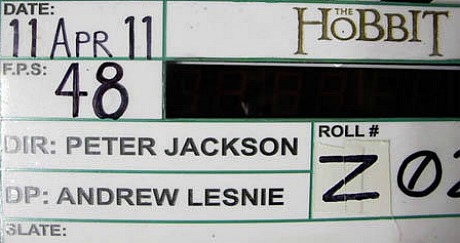
It’s like watching super high-def video, or without that filtered, painterly, brushstroke-y, looking-through-a-window feeling that feature films have delivered since forever. On one level what I saw this morning was fucking fantastic, and on another it removed the artistic scrim or membrane that separates the audience from the performers. Which gave a little feeling of “hmmm.”
The effect is that you’re not really watching a “film.” You’re watching, it seems, high-def video footage that, in an earlier time, might have been shot simultaneously along with the traditionally captured, more cinematic version that would be shown in theatres…or so you would have told yourself as you watched it in 1998 or 2005 or whenever. Except this is now and the high-def, 48 fps footage we saw this morning is it — this is how the movie will actually look.
Forget the windowpane. You’re right there and it’s breathtaking — no strobing, no flickering, pure fluidity and much more density of information. This makes the action scenes seem more realistic because it looks too real to be tricked up, and the CG stuff looks astonishing for the same reason.
Believe it or not but I, Jeffrey Wells, a Peter Jackson and Rings trilogy hater from way back, am looking forward big-time to The Hobbit now. I really am. This is going to be amazing. Shallow Hal that I am, I’m now into it big-time.
In a manner of speaking I was creaming in my pants this morning. This is almost too good, I was half-telling myself. It’s the best 3D I’ve ever seen and probably ever will see in my life. 48 fps 3D is so much easier on your eyes than 24 fps 3D. It was like being on a strange new planet, watching this process. It looks a lot like 60 fps Showscan did way back when. But it’s not “cinema” — it’s the new world. You definitely can’t see this at home. Or at least you won’t be able to for a while yet.
Younger audiences and persons like myself will, I suspect, completely flip over this when The Hobbit opens in December. And I can’t wait to see 48 fps in 2D. In fact, I agree with a statement posted this morning by About.com’s Rebecca Murray that “once audiences get to see The Hobbit screened at the 48 frames per second rate, I can guarantee moviegoers are going to demand all films be presented at 48 fps.”
But because 48 fps 3D is not “cinema” in the pre-4.28-12 sense of the term, some have reacted very negatively to what we saw this morning. Older viewers especially. Guys of a certain age are going to dig in their heels and say “nope, not me, no way…this isn’t a movie …this is live video.” Grain monks are going to have screaming fits. I can hear the rants already: “It’s too CNN! Like a local newcast report with high-def cameras. It’s not dreamy or compositional enough. The worst technical thing that has ever happened to motion pictures! It’s the new Smellovision,” etc.
I disagree. 48 fps is too jolting and breathtaking. I believe that henceforth 48 fps will not just become the norm but we’re going to hear calls for up-rezzing classic 24 fps films to 48 fps. Douglas Trumbull has allegedly done such conversions, and I for one would be highly in favor if they caught on. And yet 48 fps kills that classic filtered, strobing effect that we’ve known all our lives. It’s a shocker, all right, and I’m not sure if the industry as a whole is going to be on my side of this.
But any action or spectacle director henceforth is going to have to use 48 fps, 3D or not. It’s just too astonishing to dismiss.
Here’s a good summary of reactions so far from Indiewire‘s Kevin Jagernauth.
From AICN’s Moises Chiullan: “I have major reservations, but at the same time am beyond awed at many elements of what hit my visual cortex. Recalling the sweeping landscape shots they opened with now, I almost feel tears welling, and I can’t explain why. It was overwhelming in the most literal sense. It directly assaults your synapses with twice as much information through your retinas as you have become conditioned to expect from traditional cinema. I did not see the digital seams around creatures like Gollum and the trolls, a major benefit over 24fps. The creatures had a sense of mass in the environment, which was disconcerting in a good way.”
Incinerated
Yesterday LexG went hogwild with one of his longing-for creature-comfort tirades and shat all over the trust and respect that I offered in unblocking him a week or two ago. He could climb to the top of the Las Vegas Eiffel Tower and jump off, pulling a detonator string three or four seconds later and blowing himself into several dozen pieces of flesh, guts and bone, and he couldn’t be more dead than he is right now. Mark my words, he’ll never appear on these pages ever again. May God strike me dead with a lightning bolt if I relent again.
Throwdowns
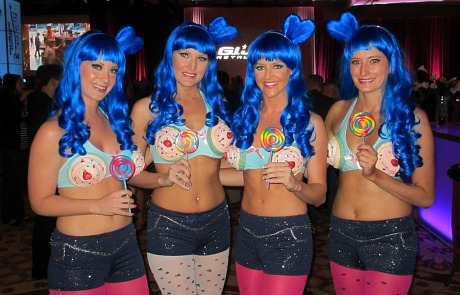
Ladies promoting Katy Perry Part Of Me 3D, which opens on 7.4, during Paramount’s after-presentation party at Caesar’s Palace.
